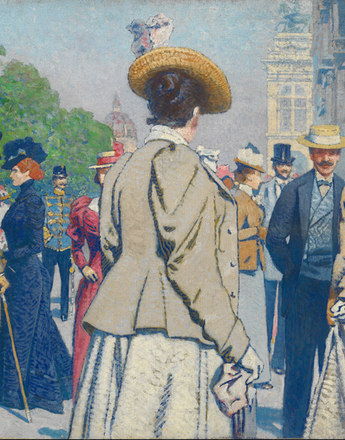Shortly prior to 1900 there was a change in political culture: reforms in the electoral system now gave the broad-based public a say in political matters. Against all expectations, this triggered a radicalisation. Now Germans and Czechs were in uncompromising opposition to each other in Bohemia – and both ethnic groups saw their national development shackled by the Austrian Empire.
In the 1880s the Czech members returned to the Imperial Council and announced the end of the obstruction policy, which had proved counter-productive. “Realpolitik” was the motto – the desire was to arrive at the great goal in small steps: the autonomy of Bohemia.
Taaffe’s conservative Government began to cooperate with the Czechs, which in return should secure the majority for the Government in Parliament. Part of the détente involved dealing with official business in the Bohemian lands in the language in which things were submitted. This would mean that authorities in purely German districts would have to guarantee administration transactions in the Czech language as well. This was rejected by the German Bohemians, since this would de facto have meant that civil servants would have to be bilingual.
Nevertheless, the German Bohemians were placed on the defensive. They were already the minority in the Bohemian Diet, and the erstwhile privileged Germans were also in dire straits in the Imperial Council, because the reform of the electoral system granted vocal access in political matters to an ever broader section of the population, also of the non-German speaking groups.
Primarily profiting from this were the new, radical mass parties which now dominated the Imperial Council. Within the Czech political scene the Young Czechs became the dominant force with their radically nationalist ideology. They sparked off massive national agitation with demands for remodelling the Bohemian countries into a Czech state, with Czech as state language and far-reaching autonomy within a federalised Habsburg Monarchy.
At the Imperial Council elections in 1891, the Young Czechs enjoyed an initial triumph. But when their demands were not complied with, there were demonstrations, which caused states of emergency to be declared in Prague and Brno. The Czech members now entered into opposition to the Government. The repudiated Prime Minister Taaffe was forced to resign (1893).
His successor, Count Kasimir Badeni, head of Government since 1895, tried – in contrast to Taaffe, whose politics were based on consensus – to act the strong man, aiming to push through solutions over and above party and nationality conflicts.
In the conflict of nationalities in Bohemia he tried to bring the electorally strong Young Czechs out of the opposition by issuing a linguistic regulation for Bohemia and Moravia in 1897. This aimed to introduce complete bilingualism of the administration in internal and external matters. Civil servants and officials were to certify their mastery of both national languages. This would have been favoured by the Czechs, because knowledge of German was standard in the history of their education, while most German Bohemians refused to acknowledge Czech as an equal language.
The outcome produced massive protests in the German-Bohemian areas, but also in other centres of German nationalism, for example in Graz. Karl Hermann, leader of the Bohemian German nationals, even pleaded for racial warfare between Germans and Slavs. But the Czech side was not prepared to bow down either, and nationalist agitators intensified their demands even more. Now violent Czech protest actions started in Bohemia, such as had recently led to a declaration of a state of emergency in Prague. The national quarrel was carried out of political committee rooms and onto the streets.
The result was escalation: German-national members of the Imperial Council now for their part began to obstruct the agenda, which ended up in scathing insults and brawls among the members. The Government was compelled to change parliamentary rules of procedure so they could use police action forcibly to end the uproar. Prime Minister Badeni finally lost control of the situation when at last the German Christian-Socialist and Social Democrat members – who had playing a waiting game until now – joined forces against the Government. The so-called Badeni Crisis ended in 1897 with his dismissal as head of the Government, also with the closure of the Imperial Council and the withdrawal of the language regulation. The Bohemian language conflict had taken Austria into a veritable state crisis.
Translation: Abigail Prohaska
Hoensch, Jörg K.: Geschichte Böhmens. Von der slavischen Landnahme bis ins 20. Jahrhundert, München 1987
Kořalka, Jiří/Crampton, Richard J.: Die Tschechen, in: Wandruszka, Adam/Urbanitsch, Peter (Hrsg.): Die Habsburgermonarchie 1848–1918, Band III: Die Völker des Reiches, Wien 1980, Teilband 1, 489–521
Kořalka, Jiří: Tschechen im Habsburgerreich und in Europa 1815 bis 1914. Sozialgeschichtliche Zusammenhänge der neuzeitlichen Nationsbildung und der Nationalitätenfrage in den böhmischen Ländern (Schriftenreihe des Österreichischen Ost- und Südosteuropa-Instituts 18), Wien 1991
Křen, Jan: Dvě století střední Evropy [Zwei Jahrhunderte Mitteleuropas], Praha 2005
Rumpler, Helmut: Eine Chance für Mitteleuropa. Bürgerliche Emanzipation und Staatsverfall in der Habsburgermonarchie [Österreichische Geschichte 1804–1914, hrsg. von Herwig Wolfram], Wien 2005
-
Chapters
- The Czechs in the Habsburg Monarchy
- How Czechs evolved from Bohemians
- The Revivalists of the Nation
- Separate Ways: The Effects of the 1848 Revolution in Bohemia
- The Vectors of Czech National Identity
- The Call for Autonomy
- Hardening of the Fronts: The Czech Demand for the Bohemian Compromise
- Attempts at Solutions and Escalation: Language Conflict and Badeni Crisis
- The Czechs’ Spectrum of Parties
- The Lack of Alternatives: the Attitude of the Czechs towards the Habsburg Monarchy at the Outbreak of the War




